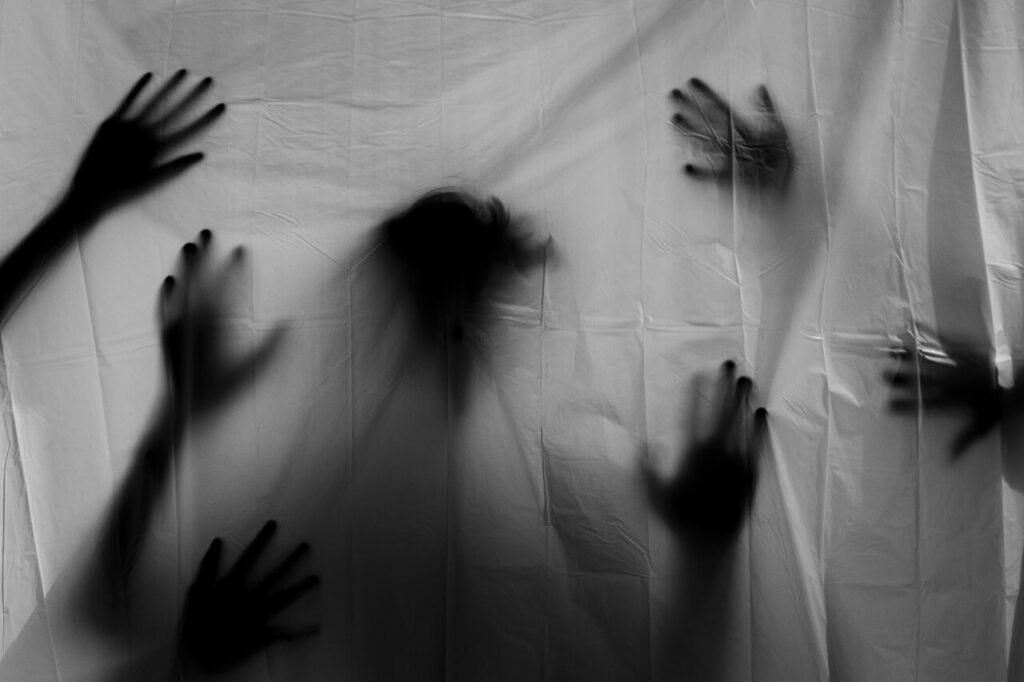The Terrifying Effects Of Poor Night Sleep and What You Can Do About It.
Late into the 1700’s, the definition of a nightmare was, “a disease when a man in his sleep supposes he has a great weight laying upon him”.
While we’ve come to understand nightmares much more in-depth since then, there’s still an incredible amount of confusion on the topic.
What causes nightmares? Why do nightmares happen in the first place? Can a bad sleep schedule cause nightmares?
If you’ve had any of these thoughts related to your own sleeping experience, you’re not alone.
Nightmares, while common, are still equally unsettling. Understanding the ins and outs of nightmares is the first step in freeing yourself from this terrifying phenomenon.
What Causes Nightmares?
Nightmares can be caused by many factors. Some are external,  while others are related to an internal struggle or due to memories tucked away by the subconscious.
while others are related to an internal struggle or due to memories tucked away by the subconscious.
A few factors that can cause nightmares are:
- Stress / Anxiety: Major changes, the death of a loved one, or any other stressors in daily life can cause nightmares. Anxiety disorder has been associated with a higher risk for nightmares.
- Trauma: Nightmares are common after a person experiences traumatic events such as a car accident, injury, or sexual abuse. Waking up from terrifying, vivid dreams recounting the trauma is incredibly common in those with PTSD.
- Medications: Antidepressants have been known to cause nightmares as the brain is altered at the molecular level. In addition, blood pressure medications, Parkinson’s treatment, and drugs used to quit smoking have all been linked to nightmares.
- Alcohol and Drug Use: As the brain undergoes many harmful changes during substance abuse, nightmares are a common side effect.
- Lifestyle Factors: Scary movies, books, or tv shows have been linked to higher rates of nightmares as the brain stores these unsettling stories in our subconscious.
A Bad Dream vs. a Nightmare:
While normal dreams are thought of as an autobiographical ‘movie’ consisting of recent events, people or situations, nightmares are different.
Nightmares are classified as any vividly realistic, disturbing, and downright terrifying dream that may consist of both familiar and unfamiliar people, places, and situations.
Unlike a bad dream, nightmares wake you from your sleep. You may find yourself suddenly jolted awake with your heart pounding out of your chest. Whether you wake out of fear, or to end the dream – this is the most common characteristic of a nightmare.
Some researchers theorize nightmares are simply ‘amped up’ versions of bad dreams. While the same process is happening in the brain, nightmares take it one step further. The emotional, visual, and physical feelings that happen during a nightmare are far more intense and realistic than a bad dream.
Night Terrors vs. Nightmares:
Another phenomenon that is often confused with nightmares is night terrors. Night terrors primarily affect children as their brains go through new neurological processes during growth.
 There is a major distinction to be made between the two, however. Night terrors are not actually dreamed. Night terrors are intense fearful physical and emotional reaction that occurs as the brain switches between sleep cycles.
There is a major distinction to be made between the two, however. Night terrors are not actually dreamed. Night terrors are intense fearful physical and emotional reaction that occurs as the brain switches between sleep cycles.
Night terrors cause children to kick, scream, cry and thrash about as their brains transition from non-REM sleep, into REM sleep. Because night terrors occur during this transitional period, children often don’t remember them.
The biggest distinction between night terrors and nightmares is the absence of any scary imagery. Unlike a nightmare, in a night terror, there is nothing provoking fear.
Symptoms Of a Nightmare:
Now that we’ve discussed the differences between other types of sleep disturbances, let’s talk about the classic symptoms of a nightmare so you can distinguish if professional help is needed.
- Your dream is hyper-realistic
- The nightmare gets worse as the dream continues
- The dream is incredibly emotionally disturbing and doesn’t get better
- Typically (but not always) the storyline has to do with safety or survival
- Your dreams wakes you from your sleep
- Upon awaking you feel sad, upset, disgusted, emotional, scared, or anxious
- You can think clearly and remember details upon awakening
- Your dream may prevent you from falling back asleep
If you feel as though your nightmares are becoming more prevalent, are causing you major problems in fatigue and focus throughout the next day, or you feel you’re beginning to exhibit problems functioning in social settings or at work, you may be suffering from a nightmare disorder.
Can Sleep Deprivation Cause Nightmares?
In our fast-paced world, we are always on the go. 35.7% of all American adults have reported sleeping fewer than 7 hours per night, constituting sleep deprivation.
Sleep deprivation can cause a plethora of problems and has been linked to:
- Obesity
- Physically inactive
- Smoking
- Depression
- High blood pressure
- Diabetes
- Heart disease
- Lower immune function
But, what about nightmares? Can sleep deprivation cause these frightful ordeals?
The short answer? Yes!
How Is Sleep Deprivation Linked To Nightmares?
If you’ve been running on empty for consecutive days in a row, and finally find the time to catch up on sleep – be warned. This can cause a REM rebound, triggering a nightmare.
When you’re sleep deprived, you sleep with greater intensity causing a heightened state of brain functioning. Dreaming becomes more intense and vivid, causing a thin veil between a normal dream, and a nightmare.
Some sleep psychologists believe the strong link between sleep deprivation and anxiety is to blame for these nightmares. When our bodies are sleep deprived, our emotional state becomes unbalanced and we experience far greater symptoms of stress and anxiety.
When this occurs, our brain is unable to connect in a healthy way, causing bizarre and horrifying nightmares.
The Health Effects Of Nightmares:
Nightmares can cause far more problems than the inability to fall back asleep after waking from one. Among adults that experience nightmares, rates of depression and anxiety were higher than those that never, or rarely suffered from them.
Other effects of nightmares may include:
- Daytime sleepiness
- Mood changes – more irritable, angry, or withdrawn
- Problems with everyday tasks
- Difficulty with cognitive function
- Insomnia
- Heightened fear behaviors
Our bodies need sleep to rest, recharge, and repair itself for the coming day ahead. If this is consistently being interrupted with disturbing imagery, leaving us gasping for air, serious implications can occur over time.
How To Get a Better Nights Sleep:

If you want to rid yourself from nightmares once and for all, you can start right away at home. Taking charge of your sleep is the first step in loosen the grip these upsetting dreams can have on you.
- Treat The Underlying Symptom: If your nightmares are caused by sleep deprivation due to a condition such as restless leg syndrome, or anxiety. Treat the root cause first. Contact your doctor to create a plan to address this before attempting to address the nightmares on their own.
- Keep a Regular Sleep Schedule: As we discussed previously, the more sleep-deprived you are, the more likely you’ll experience nightmares. When your body desperately needs sleep, it’s likely for you to sleep harder and deeper, causing an overactive increase in brain function. When your brain is used to a normal, healthy routine, it decreases the possibility for a nightmare to become triggered.
- Practice Sleep Hygiene: If you’re someone that struggles with falling and staying asleep, causing sleep deprivation, there are a few tips to help you create a calming, peaceful bedtime routine.
- Keep a cool room – ideally at 65 degrees
- Keep your bed as a ‘sleep only’ space. Don’t do any other activities other than sleep in your bed. This trains the brain to associate your bed, with falling asleep.
- Take a warm bath an hour or two prior to bed
- Turn off screens at least 30 minutes before attempting to fall asleep
- Practice a calming activity before bed such as journaling, meditation, or reading.
- Talk To Someone: There are trained professionals who dedicate their entire lives to helping those who suffer from nightmares. Reaching out for help may be the best thing you ever do for yourself.
Put Nightmares To Bed:
So, let’s quickly run through what we just discussed. Nightmares are terrifying, emotionally provoking, hyper-realistic dreams often consisting of safety or survival.
Nightmares will wake you from your dream, making it much more difficult to fall back to sleep afterward. This can cause intense sleep deprivation if left untreated.
Sleep deprivation can then cause nightmares. It’s a toxic, draining cycle.
While nightmares can be managed at home, in some cases they need professional help, and there’s no shame in doing so. You aren’t alone, and with the help of a trained specialist, you can find your way back to a peaceful, happy night’s sleep.
Resources:
- https://www.mayoclinic.org/
diseases-conditions/nightmare- disorder/symptoms-causes/syc- 20353515 - https://hms.harvard.edu/news-
events/publications-archive/ brain/nightmares-brain - https://blogs.webmd.com/from-
our-archives/20140225/bad- dreams-or-nightmares - https://www.webmd.com/sleep-
disorders/nightmares-in-adults

